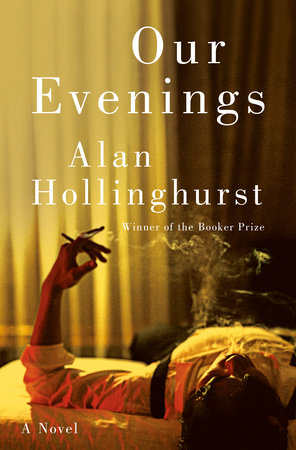Our Evenings
by Alan Hollinghurst
reviewed by Gideon Leek
With his two degrees from Oxford and a decade of service at The Times Literary Supplement, Alan Hollinghurst was the perfect candidate to make gay literature respectable in England. And he did. In 1988, Edmund White deemed Hollinghurs,t’s debut The Swimming-Pool Library “the best book about gay life yet written by an English author,” and in 2004, Hollinghurst won the Booker Prize for his fourth novel, The Line of Beauty, which like all of his books was about race, class, and gay life in England. He has continued in that vein with Our Evenings. But in this latest novel, Hollinghurst has done something different: he has written a 500-page first-person novel across racial lines. Dave Win, the narrator of Our Evenings, is in many ways a typical Hollinghurst hero: he attends Oxford, reads Henry James, and has lots of gay sex. He’s also half Burmese.
The child of a brief fling during a far-flung secretarial gig, Dave grows up with a single mother running a dress shop in the ’50s and ’60s. He’s not impoverished, but is of modest, limited means. At thirteen, a scholarship to an elite boarding school widens his class horizons. Refashioning himself from the child of a small-town single mother into the son of an assassinated foreign dignitary, Dave adapts quickly to his new surroundings. Soon he begins acting in a more formal capacity, eventually dropping out of Oxford to become a thespian. Of his time in the university, Dave recalls, “It was a useful education, for the actor, in the language of disdain.”
From when we meet him over an uneasy weekend with the benefactors of his scholarship to his grisly end on the streets of London, Dave’s life is “a chaos of privilege and prejudice.” Often it is hard for him to tell one from the other. When he receives a positive notice in The Times, he plays it off to a classmate: “Have you noticed I don’t look much like, say, Alan Bates?” But her reply, “Your appearance is just a part of your talent,” is even more telling. If what Dave loses in life can be chalked up to prejudice, and what he gains can be chalked up to Orientalism (or, later, political correctness), then what can he credit to himself? Dave, who makes a career of racial ambiguity—he calls it “a life-time of touring East Asia,” though he doesn’t get around to visiting Burma—never quite finds out. That ambiguity is both a blessing and a curse, as one boyfriend, a British actor from Liberia, points out: “David, you’re not even black.”
Nor is Alan Hollinghurst. He’s also not Burmese. It speaks either to changing attitudes among literary audiences or Hollinghurst’s increasing irrelevance that the racial element of Our Evenings has generated not so much as a stray tweet. Strange, given that this kind of project has generated a great deal of controversy in the past. (Henry Louis Gates Jr., for example, remembers a fracas among Yale students when William Styron read from Confessions of Nat Turner, and that was in 1969.) Hollinghurst, who has written eloquently about race since the opening pages of The Swimming-Pool Library, is by no means clumsy on the subject. When Dave reads a travel guide where the Burmese are referred to as “The Irish of the East,” or is cast as “an old Mexican,” or clarifies for the umpteenth time, “That wasn’t me, it was Ken Danby, the Chinese actor who is much shorter than me and five years older,” we get a sense that Hollinghurst, despite being “wary of research,” has thought this through.
Dave’s success and happiness are a matter of extraordinarily good timing. If 1967 hadn’t seen both the Sexual Offences Act and Ben Kingsley’s West End Debut, Dave wouldn’t have been any different; he’d just have had it worse. In an early scene, an older thespian warns a young Dave against acting, telling him about the career of a talented Senegalese woman: “The only parts she ever got were as a coloured maid, you know, or a slave-girl.” How strange it must have been for Dave to prove her wrong. A world that he had every reason to expect would be denied to him starts to spring open as soon as he arrives.
But with the bitter chaser Hollinghurst hangs on the end, Our Evenings is more than a meditation on good fortune: with the benefit of hindsight, we can see how fast and unexpected the twenty years between, say, Olivier’s blackface in Othello (1965) and the gay Pakistani romance in My Beautiful Laundrette (1985) must have felt, but we can also see how prejudice and hate reformed itself. There might have been space made for Dave on center stage, but waiting in the wings were those same attitudes. They got a modern reworking too.
Published on January 23, 2025

